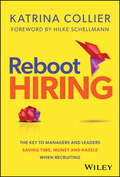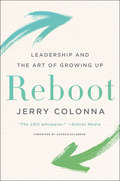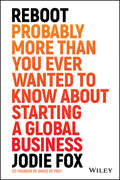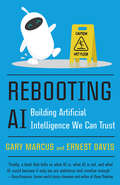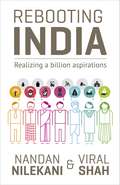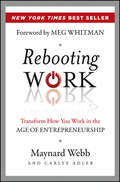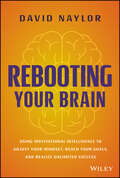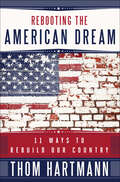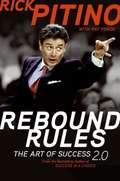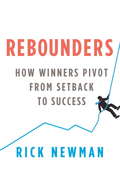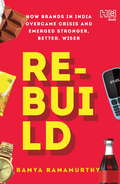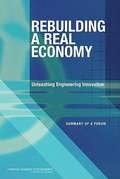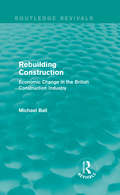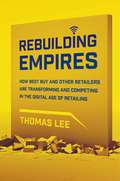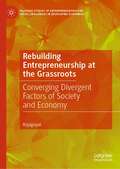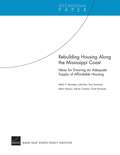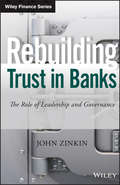- Table View
- List View
Reboot Hiring: The Key To Managers and Leaders Saving Time, Money and Hassle When Recruiting
by Katrina CollierAn incisive, practical guide giving managers and leaders the principles to elevate hiring processes—a fix within their control, today. Even today, managers and leaders can be unaware that their actions impact current and future hiring because people post openly about their experiences online. Bogged down in the day-to-day, recruiting loses priority due to time, team and project pressures. Though it should help, AI won't solve the collaboration and communication issues creating clunky, expensive, and wasteful talent acquisition processes. In Reboot Hiring: The Key To Managers and Leaders Saving Time, Money and Hassle When Recruiting, author Katrina Collier gives managers and leaders the knowledge to reset their thinking and reboot their hiring. You'll also hear tips from 60 expert recruiters and find: Forward-looking prompts to help describe the hiring need Steps for a time and energy-saving recruitment experience Critical considerations for assessments and interviews Tips for online profiles that modern applicants expect to see. An easy checklist and inspiration to encourage readers to reboot their hiring. In the distraction and transparency created by over 5 billion internet users, managers and leaders must know who they need to hire and partner effectively with talent acquisition to succeed. Reboot Hiring gives you the missing pieces of the puzzle and is invaluable to all managers and leaders wanting to save time, money and hassle when recruiting.
Reboot: Leadership and the Art of Growing Up
by Jerry ColonnaOne of the start-up world’s most in-demand executive coaches—hailed as the “CEO Whisperer” (Gimlet Media)—reveals why radical self-inquiry is critical to professional success and healthy relationships in all realms of life.Jerry Colonna helps start-up CEOs make peace with their demons, the psychological habits and behavioral patterns that have helped them to succeed—molding them into highly accomplished individuals—yet have been detrimental to their relationships and ultimate well-being. Now, this venture capitalist turned executive coach shares his unusual yet highly effective blend of Buddhism, Jungian therapy, and entrepreneurial straight talk to help leaders overcome their own psychological traumas. Reboot is a journey of radical self-inquiry, helping you to reset your life by sorting through the emotional baggage that is holding you back professionally, and even more important, in your relationships.Jerry has taught CEOs and their top teams to realize their potential by using the raw material of their lives to find meaning, to build healthy interpersonal bonds, and to become more compassionate and bold leaders. In Reboot, he inspires everyone to hold themselves responsible for their choices and for the possibility of truly achieving their dreams.Work does not have to destroy us. Work can be the way in which we achieve our fullest self, Jerry firmly believes. What we need, sometimes, is a chance to reset our goals and to reconnect with our deepest selves and with each other. Reboot moves and empowers us to begin this journey.
Reboot: Probably More Than You Ever Wanted to Know about Starting a Global Business
by Jodie FoxShoes of Prey launched in 2009. It allowed people to design their dream shoes online, get them expertly manufactured, and have them shipped to anywhere in the world within two weeks. The startup broke even at two months, hit multi-million dollar revenues in under two years, raised tens of millions in funding from top-tier investors and shipped to more than 100 countries. All the metrics pointed to huge scalability. To a huge business. To a huge success. But it didn’t succeed. In 2018 the business failed. And this is that story. Reboot tells the truth of what it is like to be at the helm of a global business. From the high highs of besting Karl Lagerfeld on global awards to the low lows of closing the doors on your dream, join author Jodie Fox on a raw journey as she reveals for the first time the story behind the story of fashion darling Shoes of Prey. This incredible ride will share lessons on raising capital, building a brand, finding suppliers, doing business in China and, most importantly, how to learn and grow from your successes and your mistakes and be ready every day to reboot for the next challenge.
Rebooting AI: Building Artificial Intelligence We Can Trust
by Gary Marcus Ernest DavisTwo leaders in the field offer a compelling analysis of the current state of the art and reveal the steps we must take to achieve a truly robust artificial intelligence.Despite the hype surrounding AI, creating an intelligence that rivals or exceeds human levels is far more complicated than we have been led to believe. Professors Gary Marcus and Ernest Davis have spent their careers at the forefront of AI research and have witnessed some of the greatest milestones in the field, but they argue that a computer beating a human in Jeopardy! does not signal that we are on the doorstep of fully autonomous cars or superintelligent machines. The achievements in the field thus far have occurred in closed systems with fixed sets of rules, and these approaches are too narrow to achieve genuine intelligence. The real world, in contrast, is wildly complex and open-ended. How can we bridge this gap? What will the consequences be when we do? Taking inspiration from the human mind, Marcus and Davis explain what we need to advance AI to the next level, and suggest that if we are wise along the way, we won't need to worry about a future of machine overlords. If we focus on endowing machines with common sense and deep understanding, rather than simply focusing on statistical analysis and gatherine ever larger collections of data, we will be able to create an AI we can trust—in our homes, our cars, and our doctors' offices. Rebooting AI provides a lucid, clear-eyed assessment of the current science and offers an inspiring vision of how a new generation of AI can make our lives better.
Rebooting India: Realizing a Billion Aspirations
by Nandan Nilekani Viral ShahA timely call to reshape government through technology, from Nandan Nilekani and Viral Shah, two leading experts in the field.For many aspects of how our countries are run - from social security and fair elections to communication, infrastructure and the rule of law - technology can play an increasingly positive, revolutionary role. In India, for example, where many underprivileged citizens are invisible to the state, a unique national identity system is being implemented for the first time, which will help strengthen social security. And throughout the world, technology is essential in the transition to clean energy.This book, based on the authors' collective experiences working with government, argues that technology can reshape our lives, in both the developing and developed world, and shows how this can be achieved.Praise for Nandan Nilekani:'A pioneer . . . one of India's most celebrated technology entrepreneurs' Financial Times'There is a bracing optimism about Nilekani's analysis . . . which can only be welcome in this age of doom and gloom' Telegraph'The Bill Gates of Bangalore . . . Nilekani achieves an impressive breadth' TimeNandan Nilekani is a software entrepreneur, Co-founder of Infosys Technologies, and the head of the Government of India's Technology Committee. He was named one of the '100 Most Influential People in the World' by TIME magazine and Forbes' 'Business Leader of the Year', and he is a member of the World Economic Forum Board.Viral B. Shah is a software expert who has created various systems for governments and businesses worldwide.
Rebooting Work
by Carlye Adler Maynard WebbFrom Silicon Valley leader Maynard Webb, how we can leverage technology to change how we workMaynard Webb has always been the go-to guy when Silicon Valley companies have thorny problems. Whether revamping eBay's crashing servers (transforming their technology weaknesses into a competitive strength) or investing in emerging technology start-ups, Webb brings strategic and operational savvy to every issue and venture. In his first book, Webb brings this same focus to tackle outdated models of work, created a century ago, which no longer sync up with either individual or employers' needs. Through a unique framework, Webb identifies 4 different mindsets around work (the company man, CEO of your own destiny, disenchanted employee, and the aspiring entrepreneur). It organizes those who are self-motivated versus those who are waiting to be discovered and aims to give readers the tools to become more self-actualized, happier, and ultimately more fulfilled in their careers. In identifying a paradigm shift that is already under way, Webb demonstrates clearly how to harness technology to embrace our own personal happiness, allowing people to become more productive at work and also spend more time with their families.Contains a framework that demonstrates how we can leverage technology to create better job opportunities and foster more balanced livesWritten by Maynard Webb, chairman of LiveOps, former COO of e-Bay, founder of Webb Investment Network (WIN), and board member of Yahoo! and salesforce.comIncludes personalized worksheets and empowering action-oriented adviceRebooting Work reveals how anyone can take control of his or her own future, finding greater fulfillment, productivity, and happiness.
Rebooting Your Brain: Using Motivational Intelligence to Adjust Your Mindset, Reach Your Goals, and Realize Unlimited Success
by David NaylorLearn—and teach others—to embrace change and collaboration In Rebooting Your Brain: Using Motivational Intelligence to Adjust Your Mindset, Reach Your Goals, and Realize Unlimited Success, leadership development and sales expert, David Naylor delivers an incisive exploration of why people struggle and how to escape the shackles that hold individuals and organizations back. Leveraging the latest insights of cognitive psychology, neuroscience, and evolutionary biology, the book presents an easy to leverage framework that allows people to understand the exact steps necessary to let go the limiting beliefs and perspectives that create unhappiness, dissatisfaction and mediocrity. Relying on the author’s unique and effective 2logical motivational intelligence-based solutions, readers will discover how to build greater success in both their career and personal life. Readers will also find: Explorations of what holds people back and how to remove those obstacles Strategies for promoting and encouraging accountability, open-mindedness, listening, reflection, engagement, and drive Techniques for reducing or eliminating risk aversion, closed-mindedness, negative attitudes, fear and instant gratification biasAn essential and practical book perfect for team leaders, managers, executives, directors, and other business leaders, Rebooting Your Brain is the evidence- and cognitive science-based resource that leaders everywhere have been waiting for.
Rebooting the American Dream: 11 Ways to Rebuild Our Country
by Thom HartmannThom Hartmann covers 11 straightforward solutions to America's current problems. At the core of each is a call to reclaim economic sovereignty and to wrest control of democracy back from the corporate powers that have hijacked both America and her citizens. What's particularly unique about Hartmann's solutions is that all have been proven to work. Every single one of his 11 steps either was historically part of what built America's greatness in the past (such as enforcing the Sherman Act and breaking up big corporations or returning to a tariff-based trade policy), or has worked well in other nations (like a national single-payer healthcare system -Medicare Part "E" for "Everybody"-or encouraging the growth of worker-owned cooperatives like the $6 billion Mondragon cooperative in Spain). From addressing the problem of a warming globe to the death of America's middle class to the loss of our essential liberties, Rebooting The American Dream shows how America can reclaim the vision of our Founders and the greatness we held both at home and abroad for over a century.
Rebooting the American Dream: 11 Ways to Rebuild Our Country
by Thom Hartmann&“If we are going to live in a democracy, we need to have a healthy middle class . . . tells us what needs to be done to reclaim what it is to be American.&” —Eric Utne, founder, Utne Reader America does not need an &“upgrade.&” For years the Right has been tampering with one of the best political operating systems ever designed. The result has been economic and environmental disaster. In this hard-hitting book, nationally syndicated radio and television host and bestselling author Thom Hartmann outlines eleven common-sense proposals, deeply rooted in America&’s history, that will once again make America strong and Americans—not corporations and billionaires—prosperous. Some of these ideas will be controversial to both the Left and the Right, but the litmus test for each is not political correctness—but whether or not it serves to revitalize this country we all love and make life better for its citizens.
Rebound Rules
by Rick Pitino Pat FordeRick Pitino is a basketball icon: the only coach in college history to lead three different schools to the Final Four, the winner of the 1996 NCAA championship, the owner of a sparkling career record, a bestselling author, and a lock for the College Basketball Hall of Fame. Yet Pitino's journey has not been without life-altering adversity: He's experienced profound personal and professional losses. In 2001, after three losing seasons as coach and president of the Boston Celtics, Pitino resigned, walking away from the $23 million left in his contract. And while recovering from the only breakdown in his extraordinary basketball career, Pitino--who had previously suffered the devastating loss of his infant son, Daniel--endured additional tragedies: His brother-in-law and best friend Billy Minardi, a trader at Cantor Fitzgerald, perished in the World Trade Center attacks of 9/11, less than a year after another brother-in-law had been fatally struck by a taxi. Pitino writes, "From that point on, my life changed forever. Nothing will ever be the same." This realization gave Pitino a new perspective. With it, the innovative leader felt the freedom to act even more dynamically than he ever had in the past. Returning to college basketball, he has rebuilt and revitalized the storied program at Louisville, guiding the Cardinals to a history-making Final Four appearance in 2005 that stamped him the only coach in history to take three schools that far. And in 2008, he rallied an injury-plagued Louisville team from a disappointing start and led it to the Elite Eight, setting the stage for greater success to come. The failures and tragedies he recounts make this book unique. More than just a recitation of what works and why, it's about how to succeed after you've failed; how to pick yourself up after being knocked down; and how to reframe yourself and see the world in a new light. This is a comeback story, a manual for overcoming life's difficulties. Pitino has experienced success as an author with his tremendously popular books Success Is a Choice and Lead to Succeed, but in Rebound Rules: The Art of Success 2.0, he's crafted a book that's more deeply personal, more inspiring, more practical, and more powerful than any he's written before.
Rebounders
by Rick NewmanLet's face it: Setbacks happen, and failure is always a possibility. But here's the good news: Amazing success has been achieved by people who once fell flat on their faces. The secret lies in how we respond to life's bumps and pot holes and unwelcome detours--from getting fired or losing a business to enduring a professional rejection or pursuing a passion that fails to pan out. Misfortune, it turns out, can be a springboard to success. In Rebounders, U.S. News & World Report journalist Rick Newman examines the rise and fall--and rise again--of some of our most prolific and productive figures in order to demystify the anatomy of resilience. He identifies nine key traits found in people who bounce back that can transform a setback into the first step toward great accomplishment. Newman turns many well-worn axioms on their head as he shows how virtually anybody can improve their resilience and get better at turning adversity into personal and professional achievement. * Setbacks can be a secret weapon: They often teach vital things you'll never learn in school, on the job, or from others. * There are smart ways to fail: Once familiar with them, you'll be more comfortable taking risks and less discouraged if they don't pan out. * "Defensive pessimism" trumps optimism: Planning for what could go wrong is often the best way to ensure that it doesn't. * Know when to quit: Walking away at the right time can free the resources you need to exploit better opportunities. * "Own the suck": When faced with true hardship, taking command of the pain and sorrow--rather than letting it command you--lays the groundwork for ultimately rising above it. Each lesson is highlighted by candid and inspiring stories from notable people, including musician Lucinda Williams, tennis champ James Blake, inventor Thomas Edison, army veteran and double-amputee Tammy Duckworth, and Joe Torre, former manager of the New York Yankees. In this uncertain and unstable time, Rebounders lays out the new rules for success and equips you with the tools you need to get ahead and thrive.From the Hardcover edition.
Rebranding Gallagher
by Rohit Deshpande Keith Chi-ho WongSteve Tucker, the Deputy CEO of Gallagher Group Limited (GGL), the world's largest electric fence company, was about to present a new branding strategy to the company's senior managers and Bill Gallagher, Jr., CEO. After spending more than 18 months with brand consultants, Tucker devised an umbrella brand strategy that would instill a uniform brand across all three business units: Animal Management Systems, Security Management Systems, and Fuel Pumps, which marketed themselves under the respective brand names of Gallagher, Cardax, Powerfence, and PEC. However, Tucker knew that the unit heads believed the differences in their clienteles, product categories, and distributor relationships made it impractical to adopt one single brand. GGL's overseas distributors had also raised concerns about a uniform brand. In many cases, GGL only owned minority interests in these distributors and retained limited control over their activities.
Rebranding Godiva: The Yildiz Strategy
by Esel Cekin Rohit DeshpandeThis case concerns Yildiz Holding's acquisition of Godiva Chocolatier from its previous owner, Campbell Soup, and its strategy in preserving Godiva's "made in Belgium" brand position. Provenance Paradox, a problem faced by companies in emerging countries trying to establish their brands in developed markets, had not become a problem for Yildiz Holding. After patiently waiting five years and seeing the company not performing as desired, Murat lker, the chairman of Yildiz, decides to change the management structure and encourage rethinking brand positioning, channels, and communications in the U.S. market. How was the Godiva brand affected by the execution problems of previous management? Why did Godiva succeed in international markets while it declined in the U.S.? What were the implications of the change in marketing strategy to Godiva's brand image?
Rebuild: How Brands in India Overcame Crisis and Emerged Stronger, Better, Wiser
by Ramya RamamurthyWhat happens when prominent brands: Send faulty products into the market? Defy governmental regulations? Back the wrong marketing message? Have management spats in public? Or simply fail to anticipate a major trend? Over the years, prominent brands in India across product categories, both home-grown and multinational, have tackled crises ? some unexpected and some self-inflicted, but each a defining factor in shaping a company?s future. In a first-of-its-kind narrative, Rebuild brings together the stories behind some of India?s biggest businesses that dealt with potential disaster and emerged on the other side ? either victorious or wiser. Digging deep into the crisis management strategies adopted by companies such as Coca-Cola, Unilever, Kingfisher, Tata Sons, Indian Premier League, Facebook, Uber, Nokia, Nestlé Maggi Noodles and several more, it analyses the steps that different organizations have taken to minimize damage to their brand, and describes how (if at all) they recovered. Featuring interviews with top management executives as well as expert brand-watchers, Rebuild closely examines the circumstances that cause brands to falter ? faulty products, leadership changes, disastrous sales cycles and competition activity, among others ? and provides invaluable insights that may serve as cautionary tales for organizations, both small and large.
Rebuilding A Real Economy: Unleashing Engineering Innovation - Summary of a Forum
by National Academy of Engineering of the National AcademiesThe financial crisis that began in 2008 is a stark demonstration that we as a nation take great risks when we build too much of our economy on a base that does not create real value. Relying on vaporous transactions to generate wealth is no substitute for making real products and providing real services. In the 21st century, the United States and the rest of the world will face some of the greatest challenges of the modern age: feeding a growing population, generating adequate energy without destroying the environment, countering chronic and emerging infectious diseases. The first decade of the new century has shown that technological innovation is essential for the United States and other countries to meet these challenges. At the 2009 Annual Meeting of the National Academy of Engineering in Irvine, California, a public forum entitled 'Rebuilding a Real Economy: Unleashing Engineering Innovation' brought together seven prominent leaders of the innovation system to discuss the challenges facing America. The insights of the panel members cut to the heart of what this nation needs to do to remain a global leader in the turbulent world of the 21st century. This summary captures the main points made by the forum participants with the aim of encouraging further reflection and discussion. As the panelists pointed out, no single action can reenergize our innovation system. A portfolio of interconnected and interdependent initiatives must be undertaken to generate new knowledge and technology and move that new knowledge successfully into a competitive world marketplace. But the panelists clarified the goal toward which we must strive and some of the most important steps we need to take to achieve that goal.
Rebuilding Asia Following Natural Disasters
by R. Michael Feener Daly, Patrick and Feener, R. Michael Patrick DalyProviding a detailed and comparative assessment of the humanitarian responses to a series of major disasters in Asia over the past two decades, including massive earthquakes, volcanic eruptions, and tsunamis, this book explores complex and changing understandings and practices of relief, recovery, and reconstruction. These critical investigations raise questions about the position and responsibilities of a growing range of stakeholders, and provide in-depth explorations of the ways in which local communities are transformed on multiple levels - not only by the impact of disaster events, but also by the experiences of rebuilding. This timely volume highlights how the experiences of Asia can contribute towards post-disaster responses globally, to safeguard future communities and reduce vulnerabilities. This is a valuable resource for academic researchers interested in post-disaster transformations and development studies, practitioners in NGOs, and government officials dealing with disaster response and disaster risk reduction.
Rebuilding Construction: Economic Change in the British Construction Industry (Routledge Revivals)
by Michael BallFirst published in 1988, this book analyses the changes that took place in the economic organisation of the British construction industry throughout the 1970s and early 1980s, in particular considering its social and economic structure and examining the causes of its poor industrial record. Michael Ball describes how the major firms survived the economic slump between 1973 and 1982 - when construction workloads collapsed - by substantially restructuring their operations, relationships with clients, workforces and subcontractors. Detailed attention is paid to construction firms, the workers they employ, the influence of trade unionism and the role of other agencies in the building process. Reissued at a particularly challenging time for the British construction industry, this relevant and practical title will be of value to students and academics of economics and social change, as well as those on courses for construction professionals.
Rebuilding Earth: Designing Ecoconscious Habitats for Humans
by Teresa CoadyA revolutionary guide to designing humane, eco-conscious homes, buildings, and cities of the future.It is estimated that the earth's population will expand to an unprecedented nine billion people over the next century. This explosion in population is predicted to place further stress on our environment, deplete our natural resources, and lead to increases in anxiety and depression due to overcrowding. In this visionary and uplifting book, Teresa Coady offers readers new hope. Rebuilding Earth is her blueprint for designing and building the cities, buildings, and homes of tomorrow, resulting in more conscious, sustainable, and humane living. Coady shows us how we can shift from an outdated Industrial-Age framework to a more humane, Digital-Age framework. This revolutionary approach will enable communities to harness various forms of green energy and reduce the amount of material needed to build infrastructure while contributing to a healthier planet (and society). We can then experience a new sense of purpose, health, and happiness. Meaningful and lasting change, the author tells us, can only come through designing interconnected communities that are vibrant, resilient, and communal. Unlike most predictions of doom and gloom, Coady presents a refreshingly optimistic view of humanity and its future. This book will appeal to those in the construction, design and development finance industries, as well as anyone interested in improving their lives through understanding the connections between the environment and health.
Rebuilding Empires
by Thomas LeeRebuilding Empires examines, through retail giants Best Buy and Target, how big box chains are constructing a new future by utilizing mobile devices, social media, and the Internet, the same technologies that once pushed them to the brink of irrelevance. This book features interviews with industry leaders and experts, including Best Buy CEO Hubert Joly, Target chief marketing officer Jeff Jones, and several other key players in both companies. Bricks and mortar retailing is not dead, and Best Buy shows others how to capitalize on their own physical spaces. Lee shows how showrooming is an asset rather than a liability, how physical space and online space are complementary, and how others can learn from Best Buy's innovations including the Geek Squad, stores within stores, and creating non-traditional partnerships. In a readable narrative format, journalist Thomas Lee explores how the world's largest consumer electronics retailer is redefining what it truly means to be a "Best Buy" in the age of online retailing.
Rebuilding Entrepreneurship at the Grassroots: Converging Divergent Factors of Society and Economy (Palgrave Studies of Entrepreneurship and Social Challenges in Developing Economies)
by RajagopalThis book analyzes the impact of entrepreneurship, technology, and innovation on meeting chronic and recurring social challenges, such as poverty, gender inequality, sustainability and climate change, income disparity, social healthcare, community housing and homelessness, and the drive to cleaner food and water supplies. It discusses inclusive entrepreneurial strategies to meet the above social challenges through transformational leadership in the developing economies.With case studies from Southeast Asia, Africa, and Latin America, the chapters highlight the success and failure of entrepreneurship in resolving the social challenges, arguing that effective convergence of strategies related to technology, innovation, and poverty alleviation influences entrepreneurial performance.Connecting different theoretical underpinnings and providing a number of frameworks, conceptual models, and cases, this work advances the conversation among entrepreneurship scholars on impacting the developing world.
Rebuilding Fiscal Institutions in Postconflict Countries
by Sanjeev Gupta Shamsuddin Tareq Benedict Clements Rina Bhattacharya Todd Mattina Alex Segura-UbiergoThe IMF's assistance to postconflict countries consists of 3 main elements: (i) technical assistance to rebuild capacity in key economic institutions; (ii) policy advice; (iii) financial and technical assistance in mobilizing donor support. The objective is to lay the basis for sustainable growth through institutional development and by addressing macroeconomic imbalances. This paper was prepared for a seminar of the IMF Executive Board. It discusses experiences in reestablishing fiscal management in those countries; reviews the challenges in rebuilding fiscal institutions based on experiences in 14 postconflict countries; and identifies key priorities in the fiscal area following the cessation of hostilities
Rebuilding Housing Along the Mississippi Coast
by Mark A. Bernstein Paul Sorensen Mark Hanson Julie Kim Adrian OvertonIn October 2005, RAND researchers went to Mississippi to help the Governor's Commission on Recovery, Rebuilding, and Renewal and the Affordable Housing Subcommittee of the Infrastructure Issues Committee. They identified policy and implementation options that could help local communities address affordable-housing issues. They considered challenges in providing affordable housing and strategies for dealing with those challenges.
Rebuilding Trust in Banks
by John ZinkinAn outline of the core principles and strategies required to restore the credibility of the global finance industrySince 2008, the global financial industry has lurched from crisis to crisis, calamity to calamity, resulting in an epic loss of public trust in banking and financial institutions. Rebuilding Trust in Banks argues that this series of disasters have usually been the result failures of leadership and governance, combined with unenforced systems of checks and balances. Often, leaders lose their way, believing their own hype and buying into their own propaganda. The more successful these leaders are initially the greater their self-confidence grows along with the certainty that they're right. The result is a dangerous hubris with no countervailing power to stop or change reckless, unethical, or self-interested strategies. This book offers a solution, with useful benchmarks for corporate governance and a global perspective.Features effective best practices for ensuring good corporate governance and responsible leadership in banking and financeWritten by a renowned expert in corporate governance with more than 40 years of experience, particularly in AsiaIntended for corporate leaders and board members in financial companies, as well as regulators, advisors, and studentsIf banks and other financial institutions truly want to rebuild the trust they once enjoyed, this practical and prescriptive guide offers effective best practices that can--and should--be widely implemented throughout the industry.
